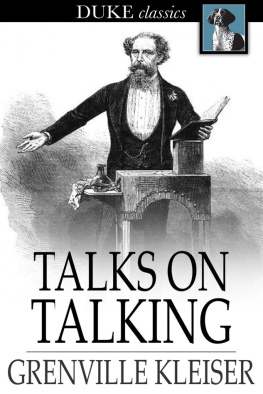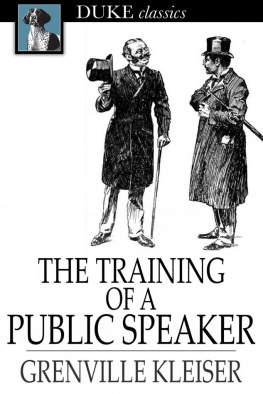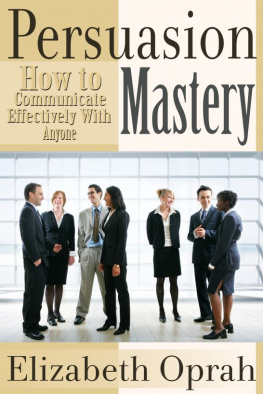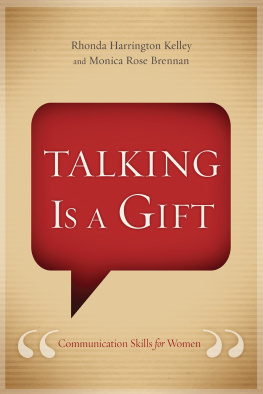Grenville Kleiser - Talks on Talking
Here you can read online Grenville Kleiser - Talks on Talking full text of the book (entire story) in english for free. Download pdf and epub, get meaning, cover and reviews about this ebook. year: 2012, publisher: Duke Classics, genre: Romance novel. Description of the work, (preface) as well as reviews are available. Best literature library LitArk.com created for fans of good reading and offers a wide selection of genres:
Romance novel
Science fiction
Adventure
Detective
Science
History
Home and family
Prose
Art
Politics
Computer
Non-fiction
Religion
Business
Children
Humor
Choose a favorite category and find really read worthwhile books. Enjoy immersion in the world of imagination, feel the emotions of the characters or learn something new for yourself, make an fascinating discovery.
- Book:Talks on Talking
- Author:
- Publisher:Duke Classics
- Genre:
- Year:2012
- Rating:4 / 5
- Favourites:Add to favourites
- Your mark:
- 80
- 1
- 2
- 3
- 4
- 5
Talks on Talking: summary, description and annotation
We offer to read an annotation, description, summary or preface (depends on what the author of the book "Talks on Talking" wrote himself). If you haven't found the necessary information about the book — write in the comments, we will try to find it.
Effective spoken communication is a fine art. Brush up your speaking skills with this timeless treatise on talking from Yale public speaking instructor Grenville Kleiser. Brimming with practical tips on how to get your point across, this book is a must-have for anyone who wants to be a better communicator.
Talks on Talking — read online for free the complete book (whole text) full work
Below is the text of the book, divided by pages. System saving the place of the last page read, allows you to conveniently read the book "Talks on Talking" online for free, without having to search again every time where you left off. Put a bookmark, and you can go to the page where you finished reading at any time.
Font size:
Interval:
Bookmark:

First published in 1916
ISBN 978-1-62012-479-6
Duke Classics
2012 Duke Classics and its licensors. All rights reserved.
While every effort has been used to ensure the accuracy and reliability of the information contained in this edition, Duke Classics does not assume liability or responsibility for any errors or omissions in this book. Duke Classics does not accept responsibility for loss suffered as a result of reliance upon the accuracy or currency of information contained in this book.
Good conversation implies naturalness, spontaneity, and sincerity ofutterance. It is not advisable, therefore, to lay down arbitrary rulesto govern talking, but it is believed that the suggestions offered herewill contribute to the general elevation and improvement of dailyspeech.
Considering the large number of persons who are obliged to talk insocial, business, and public life, the subject of correct speech shouldreceive more serious consideration than is usually given to it. It isearnestly hoped that this volume will be of practical value to those whoare desirous of developing and improving their conversational powers.
Appreciative thanks are expressed to the Editors of the HomileticReview for permission to reprint some of the extracts.
GRENVILLE KLEISER.
NEW YORK CITY,MAY, 1916.
Boys flying kites haul in their white-wing'd birds:
You can't do that way when you're flying words.
"Careful with fire," is good advice we know;
"Careful with words," is ten times doubly so.
Thoughts unexpress'd may sometimes fall back dead,
But God Himself can't kill them once they're said!
Will Carleton.
The first duty of a man is to speak; that is his chief business in this world; and talk, which is the harmonious speech of two or more, is by far the most accessible of pleasures. It costs nothing; it is all profit; it completes our education; it founds and fosters our friendships; and it is by talk alone that we learn our period and ourselves.
Robert Louis Stevenson.
Vociferated logic kills me quite;
A noisy man is always in the right
I twirl my thumbs, fall back into my chair,
Fix on the wainscot a distressful stare;
And when I hope his blunders all are out,
Reply discreetly, "To be sureno doubt!"
Anon.
The charm of conversation chiefly depends upon the adaptability of theparticipants. It is a great accomplishment to be able to enter gentlyand agreeably into the moods of others, and to give way to them withgrace and readiness.
The spirit of conversation is oftentimes more important than the ideasexpressed. What we are rather than what we say has the most permanentinfluence upon those around us. Hence it is that where a group ofpersons are met together in conversation, it is the inner life of eachwhich silently though none the less surely imparts tone and character tothe occasion.
It requires vigorous self-discipline so to cultivate the feelings ofkindness and sympathy that they are always in readiness for use. Thesequalities are essential to agreeable and profitable intercourse, thoughcomparatively few people possess them.
Burke considered manners of more importance than laws. Sidney Smithdescribed manners as the shadows of virtues. Dean Swift defined mannersas the art of putting at ease the people with whom we converse.Chesterfield said manners should adorn knowledge in order to smooth itsway through the world. Emerson spoke of manners as composed of pettysacrifices.
We all recognize that a winning manner is made up of seeminglyinsignificant courtesies, and of constant little attentions. A person ofcharming manner is usually free from resentments, inquisitiveness, andmoods.
Personality plays a large part in interesting conversation. Preciselythe same phraseology expressed by two different persons may make twowholly different impressions, and all because of the difference in thepersonalities of the speakers.
The daily mental life of a man indelibly impresses itself upon his face,where it can be unmistakably read by others. What a person is, innatelyand habitually, unconsciously discloses itself in voice, manner, andbearing. The world ultimately appraises a man at his true value.
The best type of talker is slow to express positive opinions, is sparingin criticism, and studiously avoids a tone or word of finality. It hasbeen well said that "A talker who monopolizes the conversation is bycommon consent insufferable, and a man who regulates his choice oftopics by reference to what interests not his hearers but himself hasyet to learn the alphabet of the art. Conversation is like lawn-tennis,and requires alacrity in return at least as much as vigor in service. Ahappy phrase, an unexpected collocation of words, a habitual precisionin the choice of terms, are rare and shining ornaments of conversation,but they do not for an instant supply the place of lively andinteresting matter, and an excessive care for them is apt to tellunfavorably on the substance of discourse."
When Lord Beaconsfield was talking his way into social fame, someonesaid of him, "I might as well attempt to gather up the foam of the seaas to convey an idea of the extraordinary language in which he clothedhis description. There were at least five words in every sentence thatmust have been very much astonished at the use they were put to, and yetno others apparently could so well have expressed his idea. He talkedlike a racehorse approaching the winning-postevery muscle in action,and the utmost energy of expression flung out into every burst."
We are told that Matthew Arnold combined all the characteristics of goodconversationpoliteness, vivacity, sympathy, interestedness, geniality,a happy choice of words, and a never-failing humor. When he was onceasked what was his favorite topic for conversation, he instantlyanswered, "That in which my companion is most interested."
Courtesy, it will be noted, is the fundamental basis of goodconversation. We must show habitual consideration and kindliness towardsothers if we would attract them to us. Bluntness of manner is no longerexcused on the ground that the speaker is sincere and outspoken. Weexpect and demand that our companion in conversation should observe therecognized courtesies of speech.
There was a time when men and women indulged freely in satire, irony,and repartee. They spoke their thoughts plainly and unequivocally. Therewere no restraints imposed upon them by society, hence it now appears tous that many things were said which might better have been left unsaid.Self-restraint is nowadays one of the cardinal virtues of goodconversation.
The spirit of conversation is greatly changed. We are enjoined to keepthe voice low, think before we speak, repress unseasonable allusions,shun whatever may cause a jar or jolt in the minds of others, be seldomprominent in conversation, and avoid all clashing of opinion andcollision of feeling.
Macaulay was fond of talking, but made the mistake of always choosing asubject to suit himself and monopolizing the conversation. He lecturedrather than talked. His marvelous memory was perhaps his greatest enemy,for though it enabled him to pour forth great masses of facts, peoplelistened to him helplessly rather than admiringly.
Carlyle was a great talker, and talked much in protest of talking. Noman broke silence oftener than he to tell the world how great a curse istalking. But he told it eloquently and therein was he justified. Therewas in him too much vehement sternness, of hard Scotch granite, to makehim a pleasant talker in the popular sense. He was the evangelist ofgolden silence, and though he did not apparently practice it himself,his genius will never diminish.
Font size:
Interval:
Bookmark:
Similar books «Talks on Talking»
Look at similar books to Talks on Talking. We have selected literature similar in name and meaning in the hope of providing readers with more options to find new, interesting, not yet read works.
Discussion, reviews of the book Talks on Talking and just readers' own opinions. Leave your comments, write what you think about the work, its meaning or the main characters. Specify what exactly you liked and what you didn't like, and why you think so.













